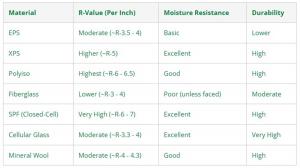Green Attic Roofing Releases Resource on Commercial Roof Insulation to Support Energy-Efficient Building Practices
Helping building owners improve energy efficiency, extend roof lifespan, and meet modern codes with smarter insulation choices.
CHICAGO, IL, UNITED STATES, July 21, 2025 /EINPresswire.com/ -- Green Attic Roofing, a trusted leader in energy-efficient and sustainable roofing solutions, has announced the release of a new educational resource focused on commercial roof insulation. The resource is designed to assist commercial property owners, architects, and contractors in making informed decisions when selecting insulation systems for new construction and roof replacement projects.
With rising demand for energy-efficient building practices and stricter building codes, selecting the right insulation has become critical. Proper commercial roof insulation enhances HVAC performance, reduces energy consumption, mitigates heat transfer, and contributes to the long-term sustainability and durability of the building envelope.
The educational content highlights industry-standard materials widely used in the commercial roofing sector, including polyisocyanurate (ISO board), extruded polystyrene (XPS), expanded polystyrene (EPS), mineral wool, fiberglass, and spray foam insulation. Each insulation type offers distinct performance advantages depending on project scope, climate, and building type.
Overview of Key Commercial Roof Insulation Options:
Extruded Polystyrene (XPS): A rigid foam board known for moisture resistance, consistent thermal performance, and high compressive strength, ideal for systems requiring long-term durability.
Expanded Polystyrene (EPS): Lightweight and cost-effective, EPS provides moderate thermal protection and is often selected for budget-conscious projects and lightweight fill applications.
Spray Polyurethane Foam (SPF): Applied seamlessly for continuous coverage, spray foam insulation delivers excellent moisture resistance and stable R-value performance, making it suitable for irregular roof shapes and retrofit projects.
Mineral Wool: Non-combustible with sound-absorbing properties, mineral wool is often used in industrial and high-rise buildings for its fire resistance and durability.
Cellular Glass: Highly resistant to moisture and fire, cellular glass is recommended for green roofs, industrial applications, and environments requiring extreme durability.
Fiberglass: A widely used material offering cost-effective insulation with added acoustic benefits, commonly installed under metal panels and in pre-engineered buildings.
Ensuring Compliance with R-Value Requirements
Achieving minimum R-value requirements, typically between R-20 and R-30 or higher, ensures commercial roofing systems comply with modern building codes and deliver reliable energy performance. In Illinois, R-30 continuous insulation remains a standard benchmark for commercial roofing assemblies, supporting both energy efficiency and long-term operational savings.
Proper insulation not only improves building resilience and energy conservation but also enhances performance against environmental factors like moisture, temperature fluctuations, and mechanical stress. These factors contribute significantly to the longevity of the roofing system and the overall energy profile of the building.
About Green Attic Roofing
Green Attic Roofing provides professional commercial and residential roofing services throughout the Chicago area. Since 2018, the company has delivered high-performance solutions for architectural shingles, flat roofing, premium metal, slate, and DaVinci roofing systems. As certified Tesla Solar Roofing Installers, Green Attic Roofing offers solar energy solutions alongside roof rejuvenation, skylight installation, and Tesla Powerwall services.
Dumitru Nicolaescu
Green Attic Roofing
+1 847-858-0876
email us here
Visit us on social media:
LinkedIn
Bluesky
Instagram
Facebook
YouTube
TikTok
X
Legal Disclaimer:
EIN Presswire provides this news content "as is" without warranty of any kind. We do not accept any responsibility or liability for the accuracy, content, images, videos, licenses, completeness, legality, or reliability of the information contained in this article. If you have any complaints or copyright issues related to this article, kindly contact the author above.
Save Ideas Shows How to Patent an Idea for Free with New Zero-Cost Protection Platform
MOVE! App Enables Ground Reaction Force Estimation and Full 3D Biomechanical Analysis Using Only an iPhone
Saving Lives is ‘big business’ and needs investors, says Project Rescue
Więcej ważnych informacji
 Jedynka Newserii
Jedynka Newserii

 Jedynka Newserii
Jedynka Newserii

Konsument

Polacy nie korzystają z hossy trwającej na warszawskiej giełdzie. Na wzrostach zarabiają głównie inwestorzy zagraniczni
Od października 2022 roku na rynkach akcji trwa hossa, nie omija ona także warszawskiej giełdy. Mimo to inwestorzy indywidualni odpowiadają zaledwie za kilkanaście procent inwestycji, a o wzrostach decyduje i na nich zarabia głównie kapitał z zagranicy. Widać to również po napływach i odpływach do i z funduszy inwestycyjnych. Zdaniem Tomasza Koraba, prezesa EQUES Investment TFI, do przekonania Polaków do inwestowania na rodzimej giełdzie potrzeba zysków z akcji, informacji o tych zyskach docierającej do konsumentów oraz czasu.
Polityka
Obowiązek zapełniania magazynów gazu w UE przed sezonem zimowym ma zapewnić bezpieczeństwo dostaw. Wpłynie też na stabilizację cen

Unia Europejska przedłuży przepisy z 2022 roku dotyczące magazynowania gazu. Będą one obowiązywać do końca 2027 roku. Zobowiązują one państwa członkowskie do osiągnięcia określonego poziomu zapełnienia magazynów gazu przed sezonem zimowym. Magazyny gazu pokrywają 30 proc. zapotrzebowania Unii Europejskiej na niego w miesiącach zimowych. Nowe unijne przepisy mają zapewnić stabilne i przystępne cenowo dostawy.
Infrastruktura
Gminy zwlekają z uchwaleniem planów ogólnych zagospodarowania przestrzennego. Może to spowodować przesunięcie terminu ich wejścia w życie

Reforma systemu planowania i zagospodarowania przestrzennego rozpoczęła się we wrześniu 2023 roku wraz z wejściem w życie większości przepisów nowelizacji ustawy z 27 marca 2003 roku. Uwzględniono w niej plany ogólne gminy (POG) – nowe dokumenty planistyczne, za których przygotowanie mają odpowiadać samorządy. Rada Ministrów w kwietniu br. uchwaliła jednak ustawę o zmianie ustawy z 7 lipca 2023 roku, a jej celem jest zmiana terminu obowiązywania studiów uwarunkowań i kierunków zagospodarowania przestrzennego gmin na 30 czerwca 2026 roku. Wskazana data może nie być ostateczna z uwagi na to, że żadna z gmin nie uchwaliła jeszcze POG.
Partner serwisu
Szkolenia

Akademia Newserii
Akademia Newserii to projekt, w ramach którego najlepsi polscy dziennikarze biznesowi, giełdowi oraz lifestylowi, a także szkoleniowcy z wieloletnim doświadczeniem dzielą się swoją wiedzą nt. pracy z mediami.










.gif)

 |
| |
| |
|